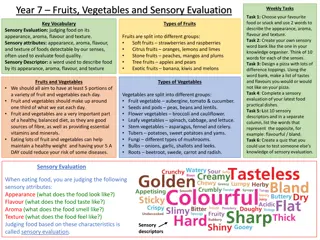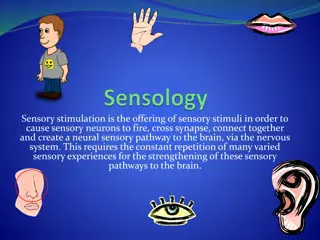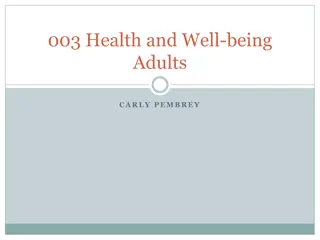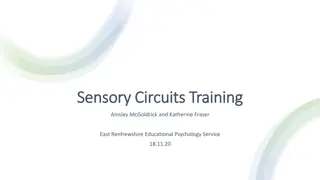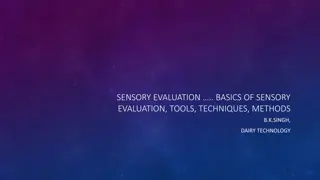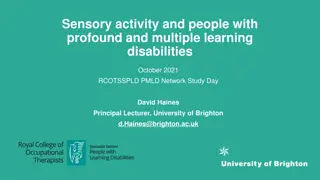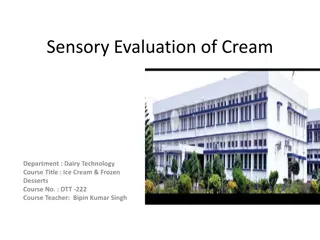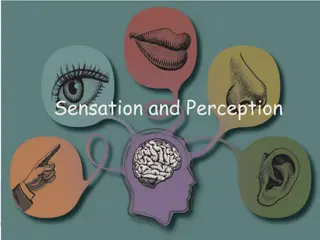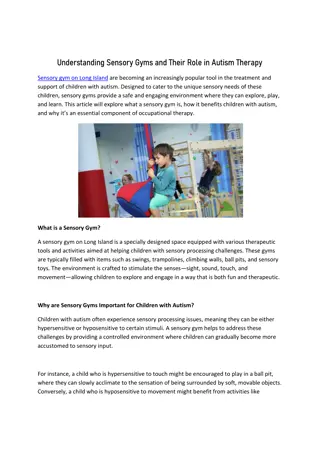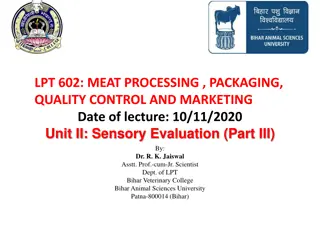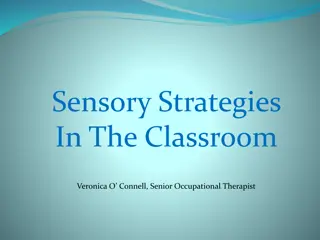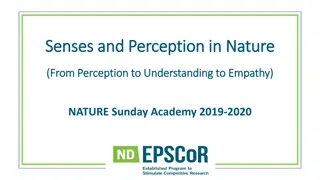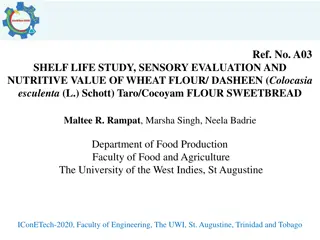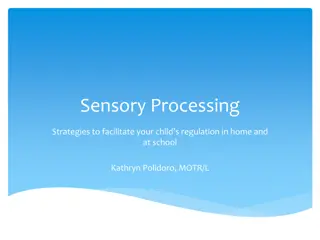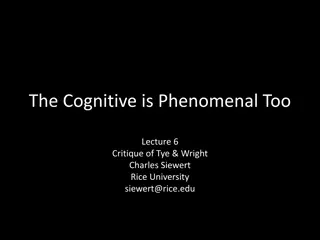Understanding Sensory Processing and Relationships: Exploring Individual Differences
Explore the intricate connections between sensory processing and behavioral responses, delving into how individual variations in sensory patterns can impact relationships, engagement, and daily routines. Gain insights into the significance of sensory experiences in nurturing brain function, and learn about the diverse sensory cues that inform our perception of the body and spatial awareness.
Uploaded on Sep 13, 2024 | 0 Views
Download Presentation

Please find below an Image/Link to download the presentation.
The content on the website is provided AS IS for your information and personal use only. It may not be sold, licensed, or shared on other websites without obtaining consent from the author. Download presentation by click this link. If you encounter any issues during the download, it is possible that the publisher has removed the file from their server.
E N D
Presentation Transcript
UNDERSTANDING SENSORY PROCESSING AND RELATIONSHIPS Debi Hinerfeld, PhD, OTR/L, FAOTA Occupational Therapist TIC-CON 2024 Dallas, Texas
OBJECTIVES 1. Discuss the concepts of sensory processing and different ways that individuals respond behaviorally. 2. Evaluate individual sensory processing patterns and understand salient individual differences that can trigger tics. 3. Compile sensory strategies that support personal sensory processing for optimal engagement in satisfying routines, activities, and relationships.
HUMAN BEINGS ARE SENSORY BEINGS Are you ticklish? Do you cut tags out of your clothes/dislike seams in the toes of socks? Do you need to jog hard to have a good day? Do you pucker severely when you taste lemon? Do you keep the shades down or welcome in bright sunlight? Do you like loud music?
SENSATION IS NUTRITION FOR THE BRAIN Sensory information is the fuel that runs the brain so we must have sensory experiences to have brain power Each person though needs a different amount of fuel Some need more Some need less Individual sensory patterns are important to understand your own and others behaviors
SENSATIONS THAT TELL US ABOUT OUR BODIES
SENSE OF TOUCH TELLS US ABOUT THE EDGES OF OUR BODY Image Citation: https://cdn.24.co.za/files/Cms/General/d/2334/39ff 0de08911485b9b2cee055542d221.jpg
Image Citation: https://kathytemean.wordpress.com POSITION SENSE KEEPING TRACK OF WHERE BODY PARTS IN SPACE
MOVEMENT SENSORS KEEP TRACK OF WHERE YOU ARE IN SPACE Image Citation: https://www.google.com
ORAL SENSORS TELL US ABOUT FLAVOR, TEXTURES, AND TEMPERATURES Image Citation: https://images.unsplash.com/
SENSATIONS THAT TELL US ABOUT THE WORLD AROUND US
VISUAL SENSES CREATE OUR MAP OF THE WORLD Image Citation: https://www.google.com
AUDITORY SENSATIONS MAP THE DISTANCE AROUND US Image Citation: https://stock.adobe.com
SMELL IS CONNECTED TO OUR EMOTIONS Image Citation: https://stock.adobe.com
SENSATIONS AFFECT BEHAVIOR IN EVERYDAY LIFE Picky about clothing fabrics Touch objects in stores Dislike messy hands Fiddle with objects in your hands Trip frequently Like massages Hold head in hands at table Use yoga as a primary exercise Get dizzy easily Crave amusement park rides Picky eater Love different food textures and strong tastes Keep room dark Seek a lot of natural light Wear earplugs or cover ears Listen to music while working Sensitive to perfumes or strong smells Adds aroma to rooms
WHAT IS YOUR SENSORY PATTERN? Complete the questionnaire
SELF REGULATION OF SENSORY RESPONSES Active self-regulation means doing something to try to control sensory input Passive self-regulation means letting things happen and then reacting https://www.google.com https://www.google.com
Image citation: Neurodivergent insights
SENSATIONAL RELATIONSHIPS Seekers in relationships Are spontaneous and good at generating new ideas and creating novel situations Can make life unpredictable and make it hard for others who need more structure Avoiders in relationships Good at creating schedules and routines to be able to predict what will happen Create calm, quiet, and orderly environments Challenged with unplanned things that happen unexpectedly and are easily overwhelmed Sensors in relationships Are more aware of moods, needs, and patterns of behavior Vocal about their own sensory perceptions Challenged with busy sensory environments and can be short tempered when they reach their low registration threshold Bystanders in relationships Easy going and flexible Takes a lot of sensory information for a bystander to notice something Challenged with detecting situations that require attention
TIPS FOR SENSATIONAL LIVING Seekers Provide more textures, movements smells, bumping and crashing, rolling, swinging, running, climbing, etc. Use heavy work for calming before homework, bed, meals, car rides, etc. Use extracurriculars such as gymnastics, ninja courses, obstacle courses, playground, swimming, etc Bystanders Post schedule of activities to remind Bystander of events occurring, have the bystander run errands, use background music Use visual reminders Increase intensity of sensory input (louder voice, more colorful surroundings, more visual cues)
TIPS FOR SENSATIONAL LIVING Sensors Use unscented products in the home, create routines for everyday activities and stick to them, plan ahead for changes in routines, limit time in crowds, limit tv and radio to one at a time, keep window shades closed or angled Avoiders Post schedule of daily routine/activities, create separate spaces in living area, keep groups small, create a set menu of meals for the week, listen to music/tv on headphones,
NEGOTIATING SENSATIONAL RELATIONSHIPS Tune into each other s sensory patterns and needs Construct mutual experiences that are satisfying to both individuals Turn irritations into quirkiness, battlegrounds into playgrounds and differences into priorities for coping with each other s differences Turn volatile situations into nurturing experiences Allow each other to meet needs and obligations through understanding
EXAMPLES? How have you experienced sensory differences with a loved one? What happened? What did you do? Based on what was learned today, would you respond differently or the same? Is there anything from this information that could support your relationship with someone who has a tic disorder? How would that change your relationship? Why would it change your relationship?
REFERENCES. Costa-L pez B, Ferrer-Cascales R, Ruiz-Robledillo N, Albaladejo-Bl zquez N, Bary a-Matejczuk M., (2021). Relationship between Sensory Processing and Quality of Life: A Systematic Review. Journal of Clinical Medicine, 10(17). doi: 10.3390/jcm10173961. PMID: 34501408; PMCID: PMC8432132. Dunn, W. (2007). Supporting Children to participate successfully in everyday life by using sensory processing knowledge. Infants & Young Children, 20(2), 84-101. doi: https://doi.org/10.1097/01.IYC.0000264477.05076.5d Dunn, W. & Brown, Cantana, E. (2002). Adolescent/Adult Sensory Profile. Pearson. Kerley LJ, Meredith PJ, Harnett PH. The Relationship Between Sensory Processing and Attachment Patterns: A Scoping Review. Canadian Journal of Occupational Therapy. 2023;90(1):79-91. doi:10.1177/00084174221102726 Cervin, M. Sensory Processing Difficulties in Children and Adolescents with Obsessive-Compulsive and Anxiety Disorders. Res Child Adolesc Psychopathol 51, 223 232 (2023). https://doi.org/10.1007/s10802-022-00962-w







